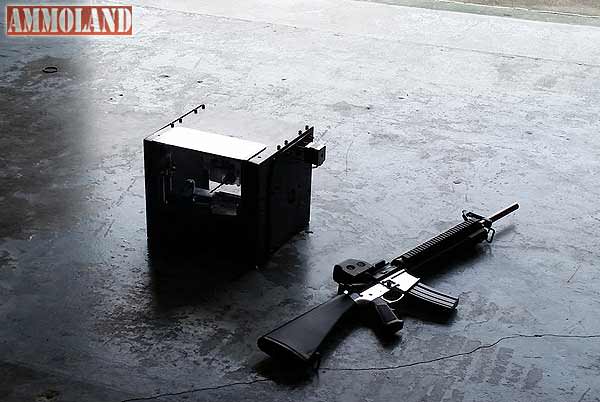
LOS ANGELES, CA -(Ammoland.com)- The Second Amendment Foundation (SAF) and Defense Distributed have teamed up to sue the State of California over its ban on CNC machines used for producing unserialized firearms and a law letting the State recover attorney fees from plaintiffs and their lawyers.
California passed a law banning the sale of CNC machines made exclusively to finish frames and receivers. Most feel the ban was directly targeting the Defense Distributed Ghost Gunner. The Ghost Gunner is a desktop CNC machine. It makes it simple to complete AR-15s, AK47s, Polymer80s, and 1911s. The system cost between $2500 and $3000 to purchase. Defense Distributed includes the codes to finish AR15s with the packaging.
Defense Distributed used to sell unfinished frames and receivers until the Bureau of Alcohol, Tobacco, Firearms, and Explosives (ATF) new rule surrounding the definition of a firearm went into effect on August 24th, 2022. After the rule was enacted, the Texas-based Non-profit stopped selling all unserialized frames.
Ahead of that new regulation, Defense Distributed had already stopped selling frames and receivers to California residents.
In their official capacities, the defendants in the case are California Attorney General Rob Bonta and Luis Lopez, director of the California Bureau of Firearms. The case is known as Defense Distributed v. Bonta.
“What we’re talking about is a milling process,” said SAF founder and Executive Vice President Alan M. Gottlieb, “which is common in modern manufacturing of a wide range of products, including firearm frames and receivers. Despite the long standing tradition of personal firearms manufacture by private citizens, California has now criminalized the process.
“What’s worse,” Gottlieb continued, “is that the state has enacted legislation that could financially penalize anyone, including an attorney or an entire law firm, if they seek declaratory or injunctive relief from any firearms-related California state statute or local ordinance, or even a rule or regulation by making them liable to pay attorney’s fees and costs of the prevailing party. Simply put, anybody seeking to enjoin a California gun restriction faces the prospect of liability for the state’s attorneys’ fees if the plaintiff does not win in all respects of the case, even if their case prevails on the merits, settles a claim without a waiver or voluntarily dismisses any portion of the case for any reason.”
“Under the law,” Gottlieb added, “the government is considered the ‘prevailing party’ if a court either dismisses any part of a claim or cause of action brought by a plaintiff seeking declaratory or injunctive relief, regardless the reason for dismissal, or if the court enters a judgment in favor of the party opposing the declaratory or injunctive relief on any claim or cause of action.”
Furthermore, the lawsuit claims that the California law violates the Second Amendment under the landmark Bruen Supreme Court case.
Bruen says that the law must be consistent with the text and historical context of the Second Amendment. The attorneys for the plaintiffs laid out the long history of Americans making their own firearms. Until recently, there was never a law in the country that prevented citizens from making their own guns. The California law goes farther than any law in the nation. It doesn’t just ban the parts but also forbids a machine that gun builders might use to complete their firearms.
The lawsuit also claims that California violated the plaintiffs’ First Amendment because of SB 1327. SB 1327 is a controversial law awarding legal fees to the State if a plaintiff loses any part of a case involving guns. The suit highlights even if the plaintiffs win on all counts besides one, the State can reclaim legal fees. The jurisdiction has up to three years to seek costs. The plaintiffs point out that even the California Senate Judiciary Committee’s analysis even commented that it might be unconstitutional.
The analysis reads that bill “is modeled after a controversial Texas abortion law, and includes a number of the same problematic procedural mechanisms.”
The plaintiffs claim this violates their right to petition the government. California based its anti-gun law on the controversial Texas abortion law. The lawyers for the plaintiffs claim that California is in a proxy war with Texas over the Lone Star State’s Heart Beat Act. California Governor Gavin Newsom even cited the Texas abortion law when he signed the bill.
The next claim that the plaintiffs make is that the law violates the Equal Protection clause of the Fourteenth Amendment. The law only allows the State to collect legal fees from those challenging gun laws. Even California’s Senate Floor analysis agrees with the plaintiffs!?
The Floor analysis reads: “Texas included a number of provisions in SB 8 to discourage lawsuits challenging the law itself . . . The mechanism for doing so was to make the party who was not the ‘prevailing party’ in such a lawsuit responsible for attorney’s fees, imposed liability for the fees on both the plaintiff and their attorney, and create lopsided and unfair rules about who was the ‘prevailing party.’ This bill replicates those provisions.”
Finally, the suit claims that the law violates the Supremacy Clause in Article VI of the US Constitution. In federal law, 42 U.S.C. § 1988(b) says the courts can award reasonable attorney fees. The plaintiffs believe the law “impedes the vindication of federal rights.”
The Second Amendment Foundation & Defense Distributed request the court issue declaratory, preliminary, and permanent injunctive relief.
Defense Distributed v. Bonta.
About John Crump
John is a NRA instructor and a constitutional activist. John has written about firearms, interviewed people of all walks of life, and on the Constitution. John lives in Northern Virginia with his wife and sons and can be followed on Twitter at @crumpyss, or at www.crumpy.com.

